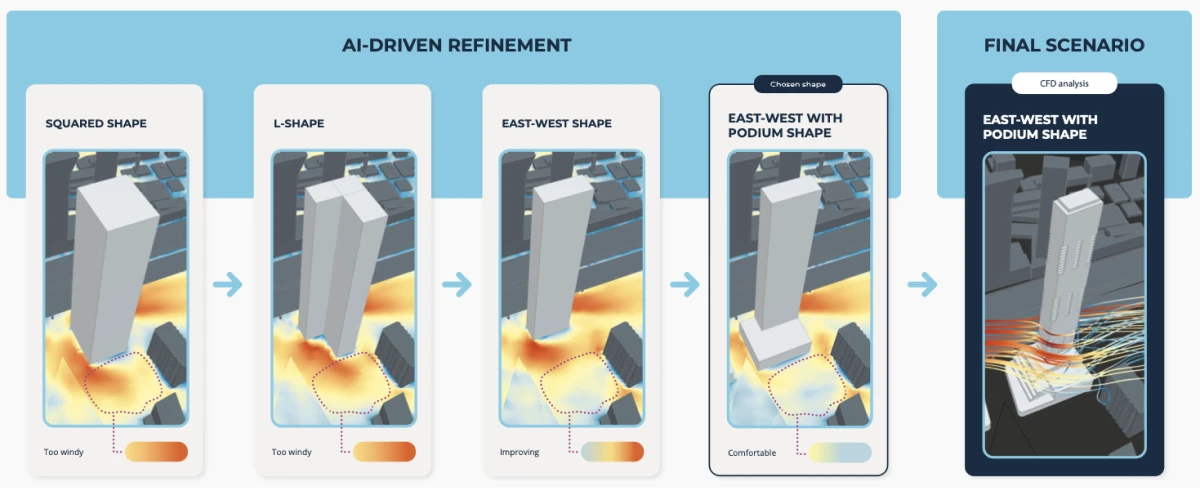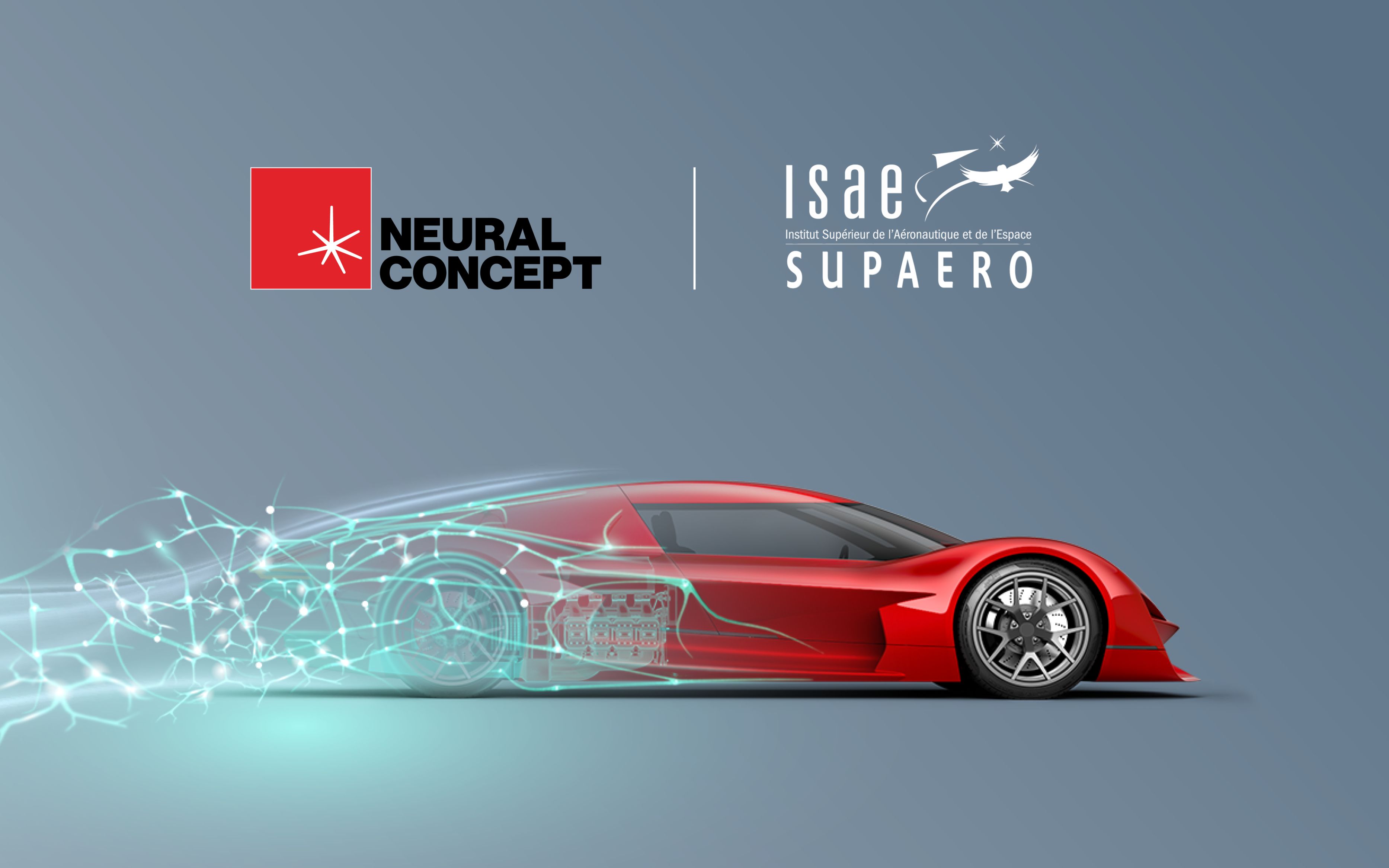AI-powered CFD Tool Based on Decades of Wind Tunnel Data

Orbital Stack, the CFD tool created by global leaders in wind engineering and microclimate analysis, RWDI, partnered with Engineering Intelligence firm, Neural Concept, in order to add the power of AI to their App for structural engineers. Orbital Stack makes climate-informed design easy, affordable, and understandable.
The limits of traditional CFD tools
Developing new buildings for cities requires designers to consider not only how the environment around the building will affect the structure, but also how the building itself will affect the environment around it. This includes evaluating the structural integrity, wind effects on the building, sunlight exposure, and pedestrian comfort. However, the traditional tools designers use to test wind performance, including wind tunnel testing and traditional CFD’s, are slow, complicated, and expensive — making them unsuitable for rapid iteration and too costly for smaller projects.
Orbital Stack now powered by AI, provides powerful, multi-factor analysis that’s fast, affordable, and understandable, giving engineers the actionable insights and rapid feedback they need to optimize outdoor comfort by managing airflow and sunlight.
Understanding at the outset how a proposed building will interact with its surroundings, specifically pedestrian level winds, saves time and cost in catching issues that may arise in later stages of the design process.

How CFD powered by AI works
Neural Concept and Orbital Stack created the ideal CFD workflow for building designers that’s fast and affordable without a reduction in the quality of the results. This partnership helped Orbital Stack take the CFD experience from standard to industry changing.
In order to help Orbital Stack optimize the designer’s experience, Neural Concept used machine learning, which relies on huge datasets to “teach” the algorithm the relationships between inputs (e.g. massing models and climate data) and outputs (e.g. airflow paths and patterns). The quality of the dataset is a critical component since it is used to validate the accuracy of the AI’s predictions. Because Orbital Stack is part of RWDI Ventures, they had access to RWDI’s urban wind flow dataset—which happens to be the largest in the world.
Working closely with Orbital Stack experts, and leveraging data from RWDI, Neural Concept developed a Deep-Learning model that is able to reproduce CFD results. The model was integrated within the existing Orbital Stack web-app, providing users with AI-enabled instant feedback.
Leveraging existing data
To enable designers to use Orbital Stack anywhere in the world, the Deep-Learning algorithm needed to be able to predict any city with a realistic wind-profile. Therefore, Neural Concept developed a robust pipeline to accept user cities in the dataset and process them in a solid and reliable way. The model must be compatible with any innovations the designers include to the city, in the shortest processing time possible. Once the city is processed, predictions are made by the Deep-Learning model within seconds, relying on the most modern techniques available in the field.
Leveraging RWDI’s expertise and decades of data from countless wind tunnel tests allowed Orbital Stack and Neural Concept to create a transformational technology that unlocks a world of possibilities for building designers.
How the AI-powered App Improves a Designer’s Workflow
Initially, designers had to wait 10 hours for each design iteration (building/surrounding change). Now, after integrating Neural Concept Deep-Learning model into Orbital Stack, the iteration time was reduced to only 2 minutes. Moreover, the simulation became more accessible: the cost per iteration has been reduced 10-fold. This allows for users to run multiple, iterative simulations and select the optimal version of their project while limiting environmental impacts on the design.
In later stages of the project, CFD or wind tunnel analysis can be performed to validate the AI-found predictions or to meet regulatory requirements.
By making design iterations available throughout the entire workflow, performance optimization and potential risks are made visible earlier in the process. Hence, it allows faster design cycles, providing on-demand, reliable airflow analysis, increased performance and sustainability of the final design, and the ability for designers to explore limitless possibilities.
The best part about the AI model of Orbital Stack is that the more the tool is used, the better the predictions become. The algorithm will “ingest” more diverse and complete cities thus better learning the physics behind pedestrian comfort.
About Neural Concept
Neural Concept creates AI Deep Learning algorithms for enhanced engineering. By speeding up R&D cycles, augmenting product performance, and solving their next engineering challenges, we revolutionize how our 80+ customers design their products. The company was founded in 2018 in a top-notch AI research lab at EPFL in Switzerland. We are a team of 30+ members fully committed to our vision, which is to revolutionize the future of industrial engineering with intelligence.
About Orbital Stack
Smart urban spaces simultaneously satisfy economic, safety, environmental, and quality-of-life needs. At Orbital Stack, we’re building the tools to help architects, designers, and engineers create the high-performance buildings that bring cities to life. An RWDI Ventures company, Orbital Stack was created by a multidisciplinary team at RWDI, the global leaders in understanding the complexities of how the localized environment and climate impacts large-scale structures—and vice versa. Learn more.
About RWDI
RWDI is a global leader in climate engineering and consulting – with capabilities in corporate sustainability, sustainable buildings, climate change consulting, and environmental engineering. They utilize their deep technical expertise to support their clients’ ambitious sustainability goals and have collaborated with design teams on significant projects around the world. RWDI has helped thousands of projects be realized through their portfolio of environmental consulting services including microclimate and pedestrian level wind testing, noise, acoustics and vibration studies, enclosure studies, and wind studies. It includes the Burj Khalifa, London Spire, Golden Gate Bridge, Taipei 101, and Switzerland’s Vals Tower. Learn more.



